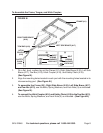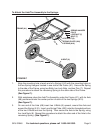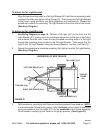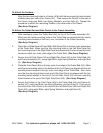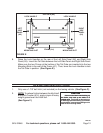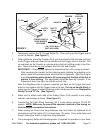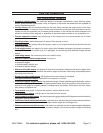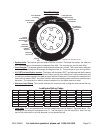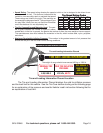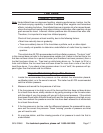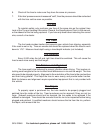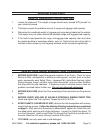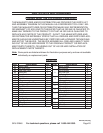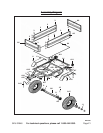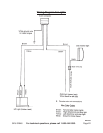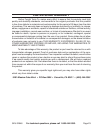
SKU 02948 For technical questions, please call 1-800-444-3353. Page 19
INSPECTION, MAINTENANCE, AND CLEANING
BEFORE EACH USE, inspect the general condition of the Trailer. Check for loose
Bolts and Nuts, misalignment or binding of moving parts, cracked, bent, or broken
parts, excessively worn Safety Chain , damaged Tail Lights/Side Running Lights/
Wiring Harness, loose Lug Nuts, loose Hitch connection, and any other condition
that may affect its safe operation. If abnormal noise or vibration occurs, have the
problem corrected before further use. Do not use damaged equipment.
BEFORE EACH USE, check the Tires according to the instructions on the previous
pages.
BEFORE EVERY USE AND AT 500 MILE INTERVALS DURING EVERY TRIP,
check and tighten the Tire Lug Nuts. Torque from 85 to 90 ft-lb.
EVERY 2,000 TO 3,000 MILES OF USE, lubricate the Hub Assemblies with a heavy
weight bearing grease. Follow the Bearing Packing Instructions as explained
on page 5. After each Hub Assembly is reassembled, tighten the Castle Nut until
the wheel starts spinning with slight resistance. Loosen the Castle Nut about 1/6
turn from this point. Insert a new Cotter Pin through the Castle Nut and the hole in
the axle. Bend the Pin back, locking it and the Nut in place.
TO CLEAN, use only water and a mild detergent.
1.
2.
3.
4.
5.
VEHICLE LOAD LIMIT
Steps for Determining Correct Load Limit
Locate the statement “The weight of cargo should never exceed XXX pounds” on
your vehicle’s placard.
That figure equals the available amount of cargo and luggage load capacity.
Determine the combined weight of luggage and cargo being loaded on the vehicle.
That weight may not safely exceed the available cargo and luggage load capacity.
If the trailer’s load exceeds the cargo and luggage load capacity, then the trailer
be unsafe resulting in hazardous effects, such as: Trailer’s tires will not be able to
maintain traction properly, and stopping distance will be increased significantly.
1.
2.
3.
4.



